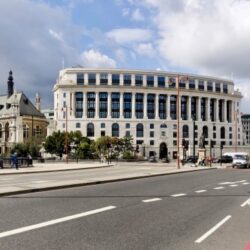Crisis was inevitable according to chaos theory
During our Trend Dinner just under a year ago, which was attended by almost a hundred supply chain directors, I predicted that we would find ourselves in an economic crisis around this time. Anyone with some understanding of chaos theory could see that the European and global economic system had become unstable and was on the verge of chaos. When asked what would trigger this economic crisis, I answered that I wasn’t sure, but that it might be Brexit. As it turned out, COVID-19 was the ‘black swan’ event, and the ensuing butterfly effect resulted in a global economic crisis.
If we liken the economy to an internal combustion engine, in the run-up to the crisis it had been running at full speed for too long. All kinds of weak spots in the economy – such as the ease with which banks granted loans to new businesses – put it at severe risk of overheating.
The situation reminded me of a scene from the film Jaws, in which the fanatical shark hunter Quint revs the engine of his boat to lure a great white shark into shallow water – but he over-revs it, the engine blows and the boat sinks, (spoiler alert!) killing Quint. His companion, police chief Brody, had previously warned him “You’re gonna need a bigger boat”, but in actual fact the boat needed a better and stronger engine.
Over-inflated product range
Now that the engine of the global economy is seriously struggling – and, in some industries, has completely stalled – companies need to think about how to get business back on track. It is crucial to decide who your most important customers are and which products you want to offer them. Even before the crisis, it was obvious that many companies had over-inflated their product ranges.
For example, a few years ago, the logistics director of car maker Skoda proudly told me that simulation software had enabled them to figure out how to fit three car bodies into one shipping container. That was necessary to ship Skodas that had been ordered in certain colours – such as purple – from the Czech Republic to Portugal for spraying.
I asked him if the considerable extra costs involved in spraying the chosen colour were passed on to the buyer as a higher price, to which he answered ‘no’. As a loyal Skoda driver myself, I advised him to include all these logistics costs (plus an extra margin) in the sales price from now on: “Sell Skodas in a small range of colours as standard, and make any special requests exorbitantly expensive.”
Simpler portfolio
Similarly, Marc Engel, Chief Supply Chain Officer at Unilever, recently explained in a webinar that his company had reduced the number of stock keeping units (SKUs) of essential products such as detergents by 65%. “A much simpler portfolio was necessary to keep our business running,” he said.
In this existential economic crisis, companies must think like a start-up and ask themselves what they really need to do to generate business. With all the analytical tools available today, it is relatively easy to use their own ERP system to generate a monthly matrix and simultaneous ABC analysis of product and customer profitability.
Chaos theory
Moreover, in the current situation, COVID-19 gives you an ideal excuse to phase out loss-making C-level items without too many complaints from the associated barely profitable customers. According to chaos theory, less complex systems are much more stable. That’s very logical. Therefore, build as simple an economic engine as possible – and preferably an electric one – that won’t overheat quickly.









